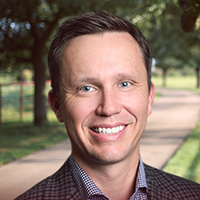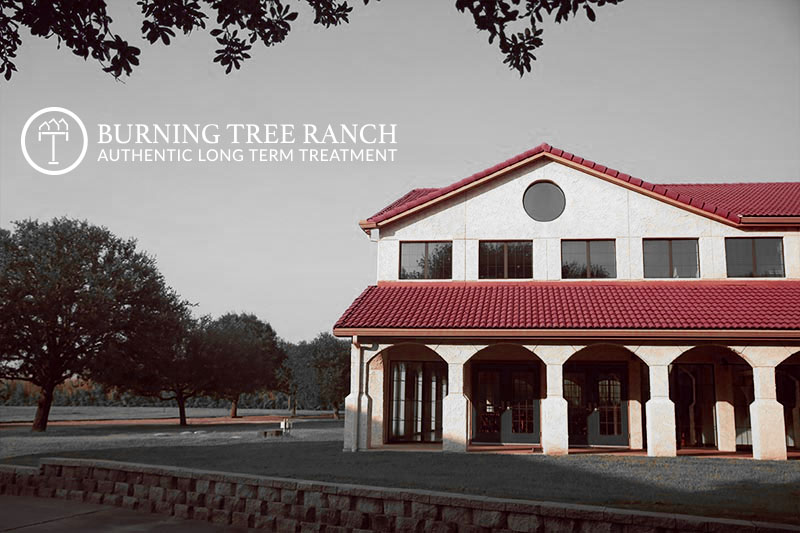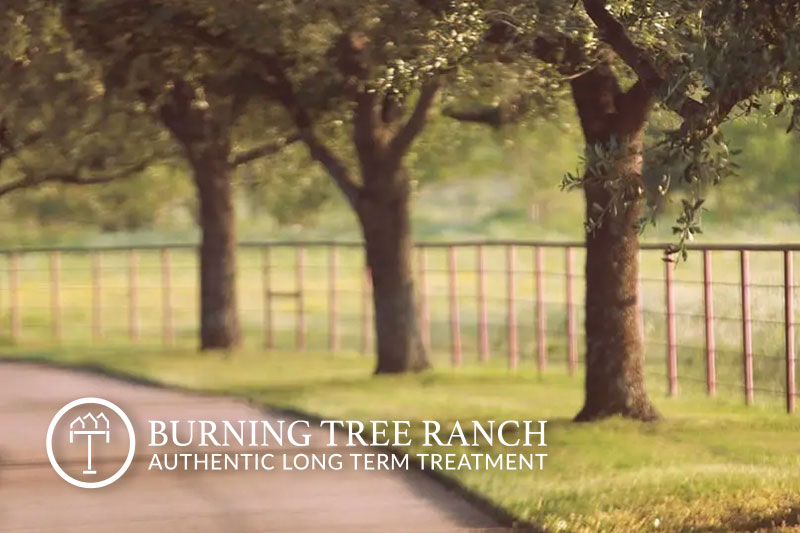The Nation's Only Authentic Long-Term Treatment Program
Burning Tree Ranch is the Nation’s only authentic long-term treatment program. We’re used to dealing with the extraordinary. That means we treat difficult, advanced stages of addiction that have not been mended in other, shorter-term treatment episodes.
Our long-term treatment center is designed to offer the appropriate amount of time to identify, treat, and recover from chronic addiction in a dual-diagnosis setting.
What Does it Mean to Undergo Long-Term Treatment?
Burning Tree is the Nation’s only authentic long-term treatment provider specializing in the treatment of chronic relapse. We address life and death matters as they relate to chronic addiction and mental health.
- Focus On Identifying Complex Emotional And Mental Health Disorders
- Emphasis On Treating Advanced Stages of Addiction And Relapse
- Multi-Phased Long-Term Continuum Aimed At Permanent Recovery
- Concentration On Dynamic Behavioral, Attitudinal, and Personality Change
- Treatment Duration Informed By Measurable, Provable Progress - Not Time

Burning Tree Graduates
Our clients engage in a highly customized, life-altering treatment program tailored to the individual. While the goal is permanent sobriety, the mission is so much more. Here’s what to expect from a Burning Tree Graduate:
- Leads a Self-Supporting, Financially Independent Lifestyle
- Remains Accountable to Self, Peers, & Family
- Speaks Transparently & Listens Actively
- Demonstrates Patience & Composure
- Responds to Stressors Practically
- Prioritizes Integrity & Embraces Sobriety
Seem too good to be true? Burning Tree is a long-term specialty program that focuses exclusively on the complex needs of chronic relapsers. In fact, that’s all we do.
What Does Burning Tree Do?
- Who is a Burning Tree Client? How do I know if my loved one is a fit for long-term treatment at Burning Tree Ranch?
- What Do We Treat? We treat underling mental health conditions that contribute to the cycle of relapse.
- What Makes Us Different? Our families have already learned what doesn't work. Finally, it's time for something different.
- What is a Progress Based Approach? Burning Tree Ranch utilizes milestone-based metrics to track, analyze, and examine progress.
- Tailored Aftercare We integrate our staff and the whole family into the transition process for our clients.
- Importance of Family Involvement We guide the entire family through the life-changing experience of long-term treatment.
Common Questions From Family Members
Engaging in long-term treatment is a big commitment for families and clients. Usually, this only becomes an option after numerous failed treatment attempts. Most families come to us with questions, the most common being “Why is Burning Tree different from what we’ve already tried?”

Why Is Burning Tree Known For Treating Complex Cases?
Burning Tree Is The Nation’s Only Authentic Long-Term Treatment Provider Specializing In The Treatment Of Chronic Relapse. We Address Life And Death Matters As They Relate To Chronic Addiction And Mental Health.
Why Does Burning Tree Only Accept Chronic Relapse Clients?
Burning Tree Treats Highly Complex, Fatally Advanced Stages Of Addiction. To Qualify, There Must Be Evidence Of Progressively Worsened Relapse Patterns, As Well As Previous Failed Attempts At Treatment And Sobriety.
Why Is Burning Tree So Focussed On Identifying The Correct Diagnosis?
Burning Tree Clients Often Arrive Misdiagnosed Or Undiagnosed. As such, Appropriate Treatments Have Never Been Rendered. Achieving The Correct Diagnosis Helps Accurately Address The Mental Health Issues That Impact Sobriety.
Why Do So Many Professionals Refer to Burning Tree?
Burning Tree Owns A Strong Track Record Of Treating Incredibly Complex Cases Of Addiction. Many Professionals Refer To Us Upon Recognizing The Severity Of Their Client’s Symptoms, Histories, And Relapse.
Family of Graduates
Our families come to us skeptical and uncertain – even hopeless. Upon completion of the program, here’s what to expect from a Burning Tree Graduate’s Family:
- Renewed Trust: A rebuilt sense of trust in their loved one and the recovery process, grounded in the tangible progress they've witnessed.
- Deepened Connections: Stronger family bonds forged through shared challenges and victories, leading to more meaningful relationships.
- Greater Understanding of Addiction: An enhanced comprehension of the complexities of addiction, enabling a more compassionate and supportive approach to recovery.
- Commitment to Ongoing Support: A dedication to maintaining the supportive structures and practices that have facilitated their loved one’s sobriety and overall well-being.
- Appreciation for the Present: An increased ability to live in the moment, valuing the time spent together and the peace that comes with recovery.
- Optimism for the Future: A hopeful outlook towards the future, believing in the possibilities that sobriety can bring to their loved one and the family.
- Adaptability and Resilience: A newfound resilience and adaptability, equipped to face life's uncertainties with strength and grace, thanks to their shared journey through recovery.
Feel unattainable? Burning Tree clients undergo a long process of transformation. Our families do, too.
Client Demographics for Our Long-Term Treatment Program
At Burning Tree Ranch, all we treat is chronic relapsers. Our clients come from a variety of demographic backgrounds, but they all have one thing in common: a repeated pattern of relapse into addiction & substance use.
Age
We’ve successfully treated clients between 18 to 72 years of age.
Gender
Both male and female clients are welcome at Burning Tree Ranch.
Country of Origin
Our clients travel from across the globe to complete the treatment program, including the United States, Canada, Europe, and beyond.
Mental Health Diagnosis
- Personality Disorders
- Bi-Polar & Related Disorders
- Anxiety Disorders
- Depressive Disorders
- Neurodevelopmental Disorders
Substance Use Statistics
- Alcohol: 65%
- Prescription Drugs & Opioids: 20%
- Stimulants: 10%
- Other: 5%
Who Refers to Burning Tree?
Since 1999, we have supported countless referring professionals in delivering ethical, high-quality solutions to the clients and families they represent.
Healthcare Providers
How Do I Know If My Loved One is a Fit for Burning Tree Ranch?
Progress and Setbacks on the Journey to Lasting Recovery
Progress and setbacks are natural parts of life, and this applies to long-term recovery. Families can better navigate the ups and downs of supporting a loved one in recovery by celebrating incremental successes, understanding the reasons behind setbacks, focusing on their well-being, and learning to recognize real commitment.

Our treatment is long-term because it is based on progress. We provide our clients the space and time to make full, permanent recoveries.


The Importance of Family Involvement
Families can be powerful allies in the long-term recovery by educating themselves, setting loving boundaries, prioritizing their well-being, and remaining vigilant for signs of trouble. Their involvement, support, and commitment are integral to breaking the cycle of chronic relapse and promoting lasting healing for the entire family system.
The 4 Phases of Our Long-Term Treatment Program
The complete long-term treatment program at Burning Tree Ranch is broken up into four key phases. We start with full residential treatment before transitioning into aftercare and independent living.
Intensive Residential Programming
Clients are immersed in our progress-based clinical environment’s structure, routine, and disciplines for chronic relapse. Everything in Phase 1 is designed to support the client in sobriety outside of treatment.
- Location: Kaufman, TX
- Emphasis: To establish the foundation for permanent recovery outside of treatment.
Supportive Residential Programming
Clients engage in a combination of continued residential treatment with overnight weekend passes to our aftercare programming & transitional living. This phase is designed to evaluate readiness for a full transition into aftercare.
- Location: Kaufman & Dallas, TX
- Emphasis: To establish the client’s preparedness to take on more responsibility in early sobriety.
Tailored Aftercare & Supportive Living
Clients reside in our gender-specific supportive housing while attending aftercare, gaining employment, continuing case management, participating in the AA community, making amends, and pursuing deeper engagements with the recovery community.
- Location: Dallas, TX
- Emphasis: For the client to become fully self-supporting while growing in sobriety, responsibility, & self awareness.
Tailored Aftercare & Independent Living
Clients become eligible for independent living with an approved sober peer while continuing their aftercare commitment, growing in their recovery disciplines, and maintaining consistent, self-supporting employment.
- Location: Dallas, TX
- Emphasis: Preparing for complete independence financially, emotionally, & spiritually.
The Journey Begins
Clients graduate the entire Burning Tree continuum of care with a strong foundation of sobriety, a comprehensive set of life skills, and a renewed purpose in life.
Celebrating Milestones on the Path to Recovery
Celebrating milestones in long-term recovery is essential to sustaining progress and hope. By offering affirmation, recognizing the distance traveled, and envisioning a future of purpose and service, families can help their loved ones build the resilience and determination needed for a lifetime of recovery. Each milestone serves as a reminder that change is possible and that a fulfilling life awaits those who persist in their healing journey.
Recognizing How Far You’ve Traveled Together
For individuals with a history of chronic relapse, recognizing how far they’ve come may involve looking back at previous attempts at sobriety and noting the increased duration, stability, and quality of life in their current recovery. It may also include celebrating the improved relationships, educational or vocational successes, and personal growth they’ve experienced.
Featured In Top Publications










